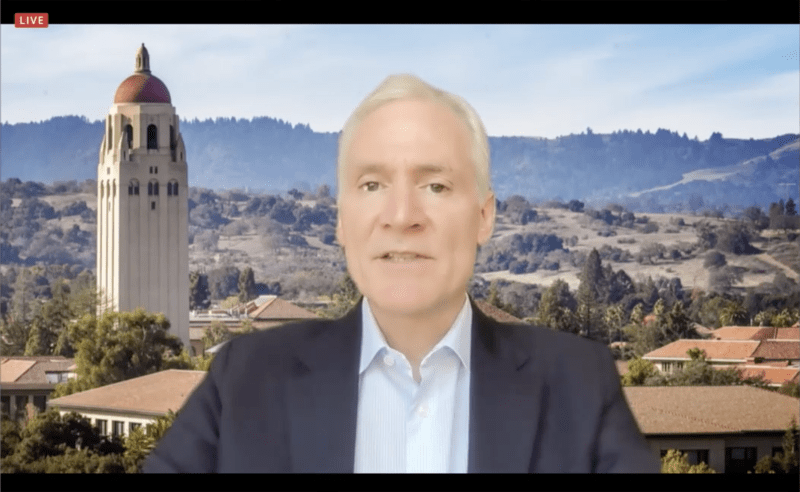Campus life in the fall will look a lot like it did before the pandemic, University president Marc Tessier-Lavigne and Provost Persis Drell said during Tuesday’s installment of Campus Conversations.
Drell said Stanford is not making any changes to in-person plans for the fall.
But, the president and the provost also emphasized the importance of caution to address the growing concerns about the delta variant — which now comprises 80% of the recent COVID-19 cases in the United States — and some employees’ wariness of coming back on campus.
“We need to remain vigilant,” President Tessier-Lavigne said.
Even though Stanford is requiring all students and employees to be vaccinated before the start of fall quarter, Drell said she does not support pressuring or any negative sentiments towards individuals who have not gotten the vaccine.
“[We] respect each other’s health decisions,” Drell said.
“It’s their personal and private information, and they shouldn’t be judged,” she added. “I do always try to encourage our community to think more of the risk of getting the vaccine versus the risk of getting COVID-19.”
All undergraduate, graduate and professional students planning to enroll in the 2021-22 academic year were required to get vaccinated by July 23. The University will place enrollment holds on students’ Axess accounts if they fail to meet the requirement or deadline.
Stanford will allow medical and religious exemptions on a case-by-case basis. Unvaccinated students will be required to get tested.
Tessier-Lavigne and Drell underscored the importance of vaccination among the measures to protect the Stanford community from COVID-19. Though they said that over 90% of people entering Stanford’s campus self-report they are vaccinated using the HealthCheck app, they continued to urge anyone who can get a vaccine to get a vaccine or talk to their healthcare provider if still hesitant.
According to the panelists, HealthCheck is currently the sole mechanism for tracking vaccination rates within the Stanford community.
Vaccines are “remarkably effective” in protecting against hospitalizations, deaths and the delta variant, Stanford Medicine chief of pediatric infectious diseases Yvonne Maldonado said, noting that “97% of all hospitalizations and deaths in the U.S. are among those who are unvaccinated.”
Mask guidance for people on campus could also change in the coming weeks, Drell said. California lifted its mask mandate on June 15, but a rise in COVID-19 cases in the following weeks caused concern among employees asked to return to campus.
The CDC recommended Tuesday morning that even vaccinated people should return to wearing masks indoors in regions with high case counts, which includes Santa Clara County.
As it stands, Stanford is not explicitly requiring masks for vaccinated employees or students in the coming quarter. However, Drell said that’s subject to change.
“It is under active debate, and I wouldn’t be surprised to see changes in masking policy,” Drell said.
Flexible schedules for employees
Many Stanford employees at the meeting said they were concerned about the flexibility regarding which days to come into work in person.
Those decisions ultimately remain at the discretion of each specific team and its manager, vice president for human resources Elizabeth Zacharias said. Depending on their responsibilities and the composition of the team, supervisors will be responsible for dictating in-person work schedules.
“Some positions, while they can be performed remotely in our individual minds, the impact to our students, our faculty, other employees who work with our role, and how effective we can be over a long time may be something else to consider,” Zacharias said.
Both Zacharias and Tessier-Lavigne spoke to, in Zacharias’ words, the “value and joy of having a human connection at work.” They agreed that morale and cohesion are understandably lacking among employees.
Tessier-Lavigne reminded attendees that a return to in-person work should prompt “how much we enjoy each other as human beings and not just as colleagues” and shared that the University “will be working very intentionally” to assist in that.
Still, for those whose roles will require them to be in-person consistently, the risks of coming onto campus remain active concerns.
“I hope you will bear with us as we deal with this, because of the many layers of complications, but also we think it’s an opportunity to really reshape how we do things,” Tessier-Lavigne said. “So I hope everybody will understand that we are in a period of experimentation right now.”
Evan Peng contributed reporting.
